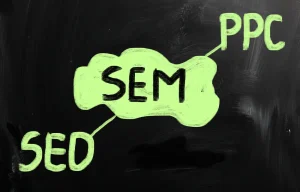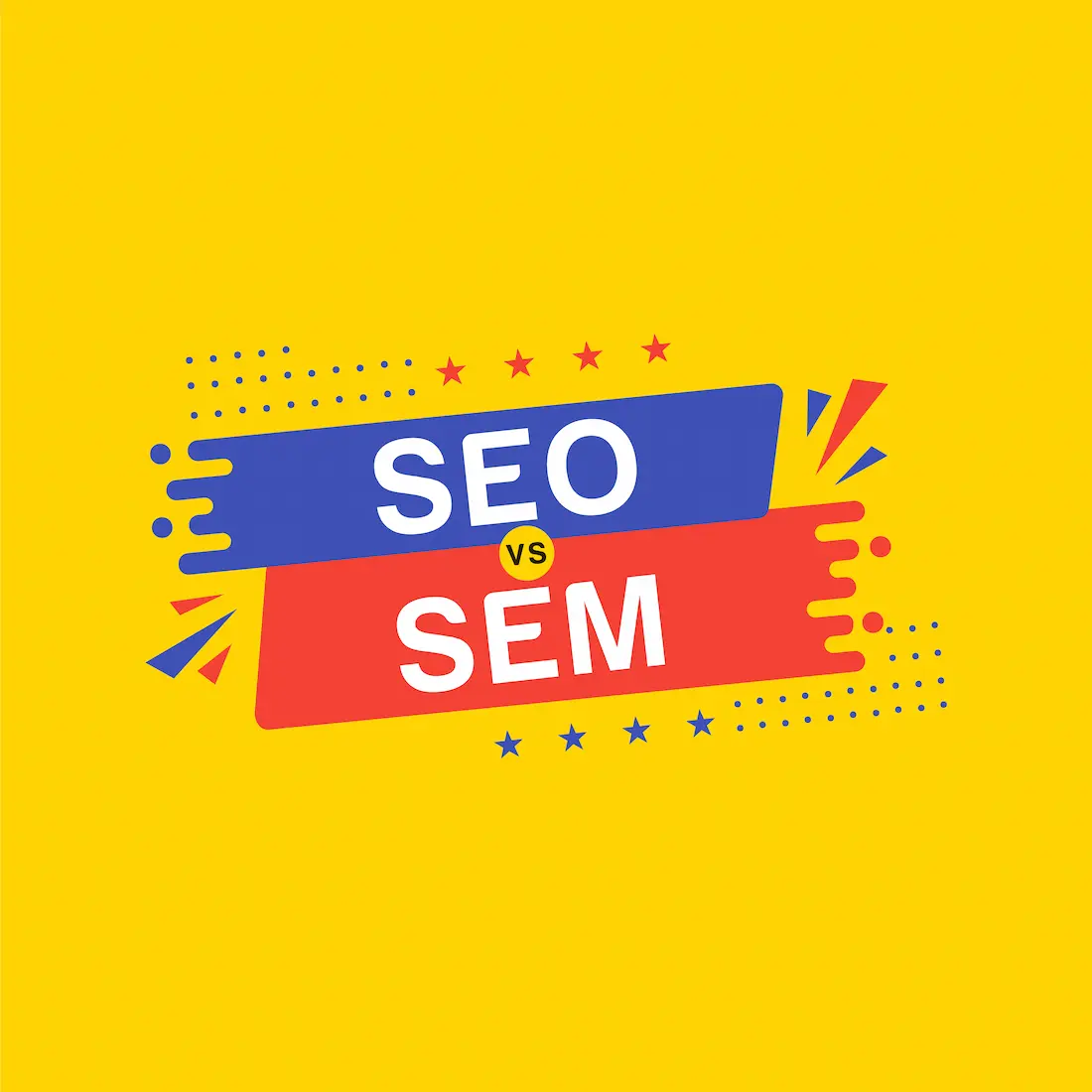SEO and SEM are two different strategies many businesses employ for a website marketing campaign. SEM, or search engine marketing, is a very effective digital marketing channel where you can increase the visibility of your website in search engine results using a combination of paid and free methods. The overall goal of SEM is to increase visibility in search engines by achieving higher rankings in search results or top positions for ad placements.
Whereas SEO, or search engine optimization, is essentially a subcategory of search engine marketing and typically "free" in the sense that you are not paying for your spot in the rankings. The work is done organically. The goal here is to rise in the rankings through the use of creating organic content for your website, which places you higher in the rankings over time. And keeps you there without paying.
Billions of people around the world turn to search engines, like Google, to look for information or products. And statistics show that most users click on one of the top ads or one of the first five organic results. So that is where you want to be as a business. Overall, the search engine marketing processes will help you get search engine traffic by placing your ads or content in one of the top results for the keywords that matter for your business or website. But choosing between SEO or SEM as the means to get there is the question. A question that the web team at MSEDP can help you navigate.
What are the Similarities and Differences of SEM & SEO?
In general, the main difference between SEM and SEO is that SEO involves techniques for optimizing a website to get organic (free) traffic from search engines while SEM involves strategies to get traffic and increase visibility by combining organic and paid search results. But there are some key similarities, too. Let's take a look at the similarities and differences between the two marketing options.
Similarities
Here are a few of the similarities between SEM and SEO when applying them to a marketing campaign.
- Both aspects improve the overall visibility of your website on search engines and will help your site show up in the SERPs through the use of targeting and optimizing for keywords.
- SEO and SEM drive a higher amount of relevant and quality traffic to your site due to keyword targeting. Both strategies encourage users to click through to your site. However, keep in mind one is a paid tactic (SEM), the other is organic (SEO).
- Helps you gain a deeper understanding of your audience, which is an important factor in a successful marketing campaign.
- Use of keyword research discovers and targets relevant keywords as both require adequate keyword research to understand what your competition is ultimately targeting and how you can target the best keywords for a campaign.
- Both SEO and SEM require ongoing testing and optimization for continuous monitoring and tweaking. This allows any marketing campaign to be successful long-term and deliver a solid ROI.
Differences
Here are the key differences between SEO and SEM when applying them to a website marketing campaign.
 SEM provides clearly marked ads on the SERPs, so you are able to distinguish a paid placement in the SERPs due to the "Ad" icon in the listing. Organic listings do not have this option, which means that organic results and paid results look different. Paid ads also offer ad extensions that allow you to enhance a standard ad with site links, callouts, phone numbers, and more. Organic rankings do offer rich snippets, too. However, you have more control over when and how these ads are displayed with ad extensions.
SEM provides clearly marked ads on the SERPs, so you are able to distinguish a paid placement in the SERPs due to the "Ad" icon in the listing. Organic listings do not have this option, which means that organic results and paid results look different. Paid ads also offer ad extensions that allow you to enhance a standard ad with site links, callouts, phone numbers, and more. Organic rankings do offer rich snippets, too. However, you have more control over when and how these ads are displayed with ad extensions.- With SEM, you pay for every single click or impression, which needs to be taken under consideration when starting out a campaign. An advertiser pays every single time the user makes a click on an ad (CPC - cost-per-click) or for CPM (cost-per-thousand impressions) depending on the type of campaign. This differs from an organic SEO campaign, as the advertiser pays nothing when a user clicks on an organic listing that ranked due to search engine optimization.
- SEM has the ability to drive almost immediate results, whereas SEO takes more time to find results. In many cases, you can instantly see results within a few clicks when a paid SEM campaign is live. Your ads will immediately show in the search results as long as they are approved and your bids are sufficient. SEO, on the other hand, will take time unless you have no competition, which is rare. It can take months to see organic results after starting an SEO campaign, but you are not paying extra for the clicks. Just paying for the work. And once the work is there, the pages and results will stay there. Keeping you at or near the top of the search results without having to pay the search engine for placement.
- The overall results of an SEO campaign are more cumulative and will add value over time compared to an SEM strategy, which is essentially a "pay as you go" strategy. This means the return on your investment will be cumulative, as well, with an SEO campaign. An organic SEO strategy builds over time and will leave lasting results that keep your place in the rankings without paying a dime to the search engines. This differs from investing in SEM, where as soon as you turn your ads off your visibility will stop, too. So if you want long-lasting results, then organic SEO is the way to go.
- SEM is easier to test and refine than SEO. In general, paid advertising will always requires testing and the ad copy will need to be revised. This way new audiences can be targeted effectively. With all of the data available, these changes can be done quickly and efficiently with little to no downtime in search results. Ultimately allowing you to reap the rewards. This differs from SEO, where you cannot test the same way given the nature of the algorithm and how long it takes for these changes to impact the rankings. Of course, testing does remain a very important part of a solid SEO strategy, but it is just not comparable in this way to what PPC allows since it takes more time to see how the changes are impacting the campaign.
Deciding What to Use Between SEO & SEM
When deciding on what method to use between SEM and SEO, it ultimately depends on what your goal is with the campaign. There are essentially two goals when marketing a website.
- If you want to drive quick traffic to a sale, test a new offer, or kickstart a slow month, then SEM is the choice.
- If you want to drive long-term growth and time is not a factor, then SEO is the way to go.
Here are three more factors when considering what to decide.
- Your existing performance is a factor. If you currently have nice visibility, then SEM may be a good way to supplement your campaign with additional visibility.
- Your overall margins. In some cases, once you take into account high click costs and low product margins, it does not make sense to run an SEM campaign. In cases like this, SEO is likely the best channel to drive stronger returns. It is worth estimating the cost-per-click that you need to pay with the PPC keyword tool and to understand what your conversion rate would need to be to make a profit. All factors that MSEDP can help when starting a PPC campaign.
- Consider the lifetime value of your customer. When using SEM, you can find that higher "Customer Lifetime Value" accounts for higher click costs. However, a lower "Customer Lifetime Value" may mean that SEO comes up as a stronger strategy.
Combining SEO and SEM
So far, this post assumes that you are only going to use one of these channels. SEO or SEM. However, in reality, many businesses combine SEO and SEM for a successful and more-rounded search strategy. These two powerful marketing channels together open up a wealth of opportunities to drive growth from potential customers who are searching for businesses just like yours.
When you combine SEO and SEM, you have the ability to integrate these channels and find yourself with these three effective ways of working.
- The ability to use data insights from your SEM strategy to supercharge your SEO approach. This includes gaining valuable insights into expected conversion rates, performance at a keyword level, estimates around traffic opportunities, and more. When working in this manner, think of SEM as a testing-bed for organic SEO services.
- You can make your organic SEO efforts work harder by creating remarketing campaigns as part of your SEM strategy in order to reach those who previously did not convert into customers. Target this audience by using search ads, display ads, and more.
- You can take over the SERPs by combining SEO and SEM and make sure you are visible both in the ads space and organic listings. Thus expanding ways for your audience to find your business.
Need Help with Website Marketing?
MSEDP can deploy a strategy that works best for your business and budget. We will take into account all aspects of your business to find the best way to market. All too often, SEO and SEM are seen as totally different channels that cannot be used together. Or they are confused as being one and the same. It is important that you understand the purpose of each of these as part of your wider marketing strategy and figure out how to use one or both of these strategies to drive success and gain a competitive advantage within search engines. MSEDP can help you navigate this terrain and help you grow your business within your budget. Contact us today for a no-obligation consultation.

 SEM provides clearly marked ads on the SERPs, so you are able to distinguish a paid placement in the SERPs due to the "Ad" icon in the listing. Organic listings do not have this option, which means that organic results and paid results look different. Paid ads also offer ad extensions that allow you to enhance a standard ad with site links, callouts, phone numbers, and more. Organic rankings do offer rich snippets, too. However, you have more control over when and how these ads are displayed with ad extensions.
SEM provides clearly marked ads on the SERPs, so you are able to distinguish a paid placement in the SERPs due to the "Ad" icon in the listing. Organic listings do not have this option, which means that organic results and paid results look different. Paid ads also offer ad extensions that allow you to enhance a standard ad with site links, callouts, phone numbers, and more. Organic rankings do offer rich snippets, too. However, you have more control over when and how these ads are displayed with ad extensions.